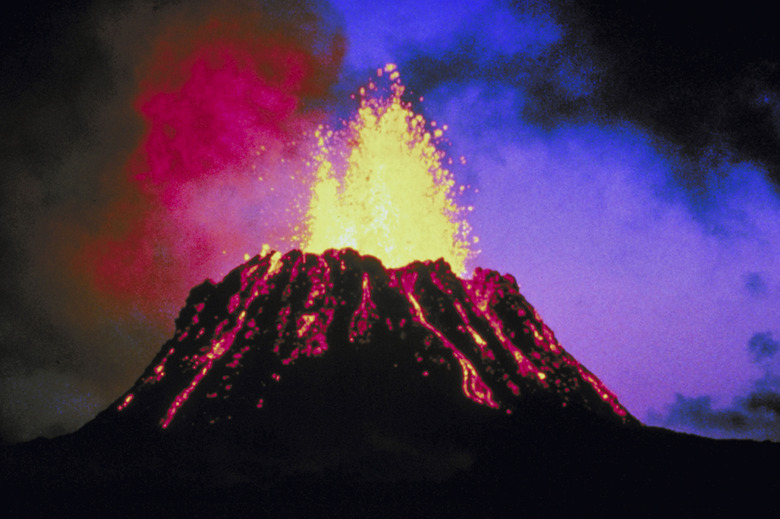What Kind Of Volcanoes Don't Erupt Anymore?
A volcanic eruption is one of the most spectacular and destructive manifestations of the energy that lies hidden within the Earth. Few natural phenomena can compare to volcanoes in their potential for loss of life, catastrophic property damage and devastating climatic effects. Many of the world's volcanoes, however, pose minimal danger because they are not likely to erupt again in the foreseeable future.
No Magma, No Eruption
No Magma, No Eruption
Volcanic eruptions are a geological method of releasing the heat and pressure that accumulates in magma, which is underground rock that has been liquefied by extremely high temperatures and mixed with gases such as water vapor and carbon dioxide. A volcano is essentially a vent that allows pressurized magma to escape from a chamber beneath the surface of the Earth. An extinct volcano is permanently cut off from its supply of magma because the volcano has gradually shifted away or because the magma begins to rise through a different path.
Extinct But Not Gone
Extinct But Not Gone
If scientists believe that a volcano has not erupted in recorded history and is not likely to erupt in the future, that volcano is classified as extinct. Volcano classification, however, is somewhat subjective and theoretical. Historical records of eruptions are incomplete, and scientists have a limited ability to assess the long-term potential for volcanic activity at a particular site. Also, the criteria for identifying a volcano as extinct are not universally accepted. A volcano might be classified as extinct, regardless of its historical activity, if it currently exhibits no signs of eruption and is deemed impossible to erupt in the future.
Sleeping Giants
Sleeping Giants
Not all inactive volcanoes are extinct. If scientists cannot detect signs of volcanic activity but do not find evidence indicating that eruptions are impossible, that volcano is classified as dormant, or "sleeping." A more precise definition states that a dormant volcano is capable of erupting but has not erupted in the past ten thousand years. Geological evidence for prehistoric eruptions is difficult to interpret, so an alternate criterion for dormancy is that the volcano has not erupted in recorded history. This definition is also imperfect, though, because the length of recorded history varies significantly from one part of the world to another.
Dormancy Versus Extinction
Dormancy Versus Extinction
The distinction between dormant volcanoes and extinct volcanoes is not always clear, and scientists often have difficulty in choosing the proper classification. Different types of volcanoes have different characteristics related to the number and frequency of eruptions. Consequently, even if two volcanoes have similar eruption histories, one might be dormant and the other extinct. For example, some types of volcanoes experience only one eruption, and these might be classified as extinct even if they erupted in recent history. Other types erupt at intervals of hundreds of thousands of years and cannot be considered extinct even if the last eruption occurred well over ten thousand years ago.
Cite This Article
MLA
West, Joseph. "What Kind Of Volcanoes Don't Erupt Anymore?" sciencing.com, https://www.sciencing.com/kind-volcanoes-dont-erupt-anymore-12318772/. 24 April 2017.
APA
West, Joseph. (2017, April 24). What Kind Of Volcanoes Don't Erupt Anymore?. sciencing.com. Retrieved from https://www.sciencing.com/kind-volcanoes-dont-erupt-anymore-12318772/
Chicago
West, Joseph. What Kind Of Volcanoes Don't Erupt Anymore? last modified March 24, 2022. https://www.sciencing.com/kind-volcanoes-dont-erupt-anymore-12318772/
